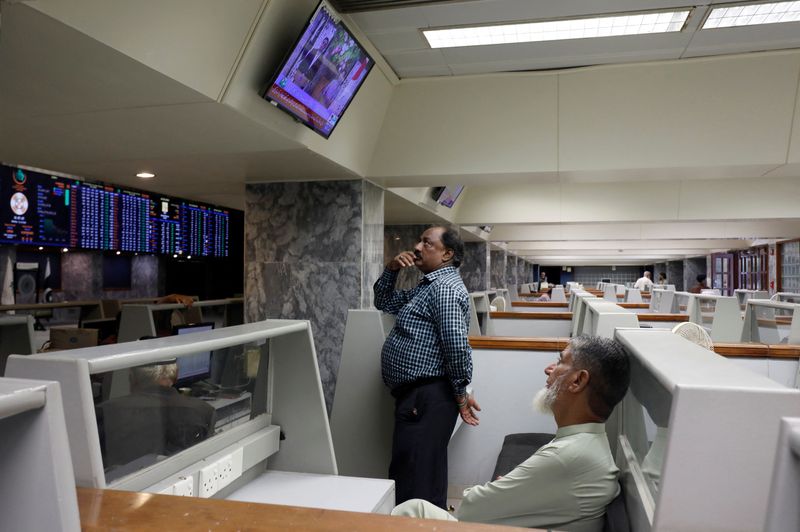By Ariba Shahid
KARACHI (Reuters) - Pakistan's benchmark share index scored its biggest single-day jump in 15 years on Monday, gaining 5.9% on the first trading session after the country secured a last-gasp funding deal from the International Monetary Fund (IMF).
The country on Friday secured a $3 billion short-term financial package from the IMF, giving its economy some much-awaited respite as it teeters on the brink of default.
"Investors' confidence is sharply reviving as a result of the staff-level agreement with the IMF and $3 billion standby arrangement," Prime Minister Shehbaz Sharif said in a statement.
The KSE 100 index closed up 2,442.06 points at 43,894.7, marking its biggest percentage gain since June 24, 2008, when it rose 8.6%, as per Refinitiv data.
In a tweet, Topline Securities noted that in points terms the increase was even more significant. "Today's gain in the benchmark KSE 100 Index will likely to be highest in the history of Pakistan Stock exchange," it said.
The Pakistan rupee was little moved amid an inter-bank trading holiday due to the start of the new fiscal year, with the local unit trading steady on the day at around 286 against the U.S. dollar.
However, there was a growing interest in Pakistani eurobonds maturing in 2024 and 2025, with limited indicative offers of any sellers.
Among key stocks to advance, automakers rose by between 6% and 7.5% on expectations that import restrictions on car parts would be lifted under the IMF deal.
Several automakers including Pakistan Suzuki Motor Co had announced prolonged plant closures in 2023, citing import restrictions.
Honda Atlas (NYSE:ATCO) Cars (Pakistan) and Pakistan Suzuki shares rose 7.5% to hit the upper limits of trading bands, while Indus Motor Co, which markets Toyota cars in the country, gained 4.2%.

"Auto sector stocks were trading at cheap valuations," said Muhammad Iqbal Jawaid, an investment analyst at Arif Habib Ltd. "With the import ban lifted and a $3.0 billion IMF deal secured, companies such as PSMC, INDU and HCAR will not face any issues in their respective supply chains."
"All the necessary parts required for the assembly of vehicles will be available on time," the analyst added.